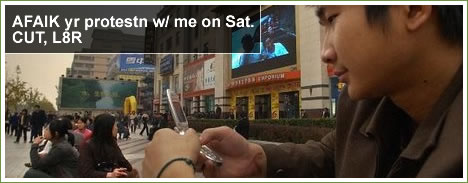Speed of Wordwide SMS Campaigns Quickening, As Is Backlash
 Protest campaigns in recent weeks in China and Pakistan are pointing to a quickening pace of social activism primarily enabled by mobile phones.
Protest campaigns in recent weeks in China and Pakistan are pointing to a quickening pace of social activism primarily enabled by mobile phones.
On May 31, 2007, authorities in Xiamen halted construction of a large petro-chemical plant, following a furious Internet, street, and text campaign. The story began on a few local blogs, spread wide on the Internet with sites like antipx.com, and street graffiti.
On March 25, according to news reports in the Asia Sentinel, Sydney Morning Herald and others, a text message began circulating:
“Xianglu Group joint venture has already begun investing in a benzene project. Once this kind of heavily poisonous chemical is manufactured, it will be like all of Xiamen has been hit with an atomic bomb, and Xiamen people’s lives will be full of leukemia and deformed children. We want to live, we want to be healthy! International organizations require this sort of project to be developed a distance of 100 km outside of a city. Our Xiamen is just 16 km away! For our children and grandchildren, send this message to all your Xiamen friends!“A shorter message read:
“For our children and grandchildren, act! Participate among 10,000 people, June 1 at 8am, opposite the municipal government building! Hand tie yellow ribbons! SMS all your Xiamen friends! “
The Sentinel reports that on "May 29, the SMS message was reportedly blocked amid claims it had reached a million people. Blocked words reportedly included “benzene “, “demonstration “, “atomic “, and “leukemia “, but only Xiamen registered numbers were blocked and numbers registered in other areas of the country were reported to work."
Nonetheless, according to news reports, over 1 million mobile phone text messages were sent by residents to organize mass rallies and protests over several days at the end of May.
For an astonishing day-by-day report of the campaign and protests, read the story on the Sentinel.
A blog commented: "That local officials in Xiamen reportedly began blocking text messages too in an attempt to stem the protests, and that the protests continued apace, is an indication that, try as it might, China's authoritarian controls simply can't keep up with the power of cell phones blogs, bulletin boards, and the smartmobs they might create. (Local governments are getting into the SMS act themselves, using text messages to warn citizens of floods and even stop protests.)"
In Pakistan, an anti-Musharraf ringtone and thousands of mobile text messages were used to organize protests after the Pakistani prime minister dismissed the country's Chief Justice on May 9. Subsequent mass protests resulted in additinal stringent media restrictions. According to dnaindia.com,
"Musharraf has of late ratified stringent measures to curtail media freedom. He did not realise, however, that dissent would find an outlet in Pakistan’s growing cellphone subscriber base. A massive campaign against Musharraf has been launched recently by the general public on cellphones.
The ‘Go Musharraf Go’ ring tone is resounding in Pakistan these days, mostly on the phones of those using the services of Mobilink. A senior Mobilink official in Islamabad, who did not want to reveal his identity, said that the number of anti-Musharraf text messages being sent and received every day runs into millions. The ‘Go Musharraf’ tone — recorded from chants of real-life protests — has been embraced by lawyers and opposition activists. But the public is just as thrilled with the insurgent trill.
As for the dictator-dissing messages, a typical SMS asks: “Who will be saved if a boat carrying Musharraf and his Corps Commanders sinks?” The answer turns out to be ‘Pakistan’.
Another popular message uses irony to deride the President of Pakistan General Musharraf: “Imagine the pleasure of living in a land where the chief justice cannot get justice for himself and the army chief, security for his life.” Satire runs through a message pretending to be a campaign letter from Musharraf himself. Part of it reads: “I have the honour of kicking out from the country two former elected prime ministers...” The letter further reads, “I am the one who had handed over hundreds of Pakistanis to the American Federal Bureau of Investigation...” The letter then goes on, to say, “I almost sold a steel mill for the price of plastic toys... Please vote for my Pakistan Muslim League (Q) stooges... or don’t vote at all, so that I can enlighten you further!”
Meanwhile, in Thailand and Yemen, governments are using SMS for political persuasion in turn, or are restricting SMS news services.
The Thai military junta is using sms to persuade people not to join protests. According to Forbes,
"Many people in Thailand have reported receiving unexpected SMS messages urging them to be calm and peaceful. 'Thai people should adhere to the king's speech, be calm ... reasonable and respect the laws,' said one message signed by the Council for National Security (CNS), as the junta calls itself. Another message read: 'The army chief and the junta leader want to see the country remain in peace and reach reconciliation. We request every party involved to do their best job and adhere to peaceful guidelines.'
Forbes reports that "demonstrations against the military regime here have escalated since a tribunal last Wednesday dissolved one of the most popular political parties. At least 6,000 people attended an anti-coup rally in Bangkok on Saturday night."
In Yemen, The Yemen Observer reports that
"The government has been restricting some SMS news services and blocking certain media websites.... “SMS news service via mobile networks are facing a legal challenge, and I call on the government to make laws to issue licenses to the companies who want to offer this service,” said Chairman of Yemeni Journalists Syndicate, Nasr Taha Mustafa. Mustafa asked the Ministry of Information to settle the problem of the restricted SMS services with al-Nass Mobile and Without Chains Mobile, in accordance with the journalism law.
The phone companies must apply to the Ministry of Information to get the needed licenses to send news via mobile networks, but al-Nass and Without Chains Mobile have been denied these licenses. September Mobile, however, was granted a license in 2005, said Mustafa. “The blocking of the al-Shora.net and al-Eshtraki.net websites was not done the right way.” Currently, al-Eshtaki.net is back online, but al-Shora is still blocked. “Those websites were blocked for readers inside Yemen, but readers outside the country can browse those blocked sites,” said Mustafa..... The Ministry of Communications and Information Technology has denied that it has been narrowing press freedoms by restricting service messages via mobile phone (SMS), and blocking media sites on the Internet. The ministry said in a press release last Sunday that the SMS news service providers have to have an agreement with the Ministry of the Information before they start working."
It is noteworthy that at this point SMS has become an integral part of political and protest campaigns around the world, often organized by small groups of activists whose messages spread widely without much central organization, albeit supported by email and the Web. Likewise, governments are recognizing the power of such mass mobilizations and inexpensive and effective methods of mass communication amongst activists, making security and alternative ways to communicte in the event of a shut-down all the more important.

